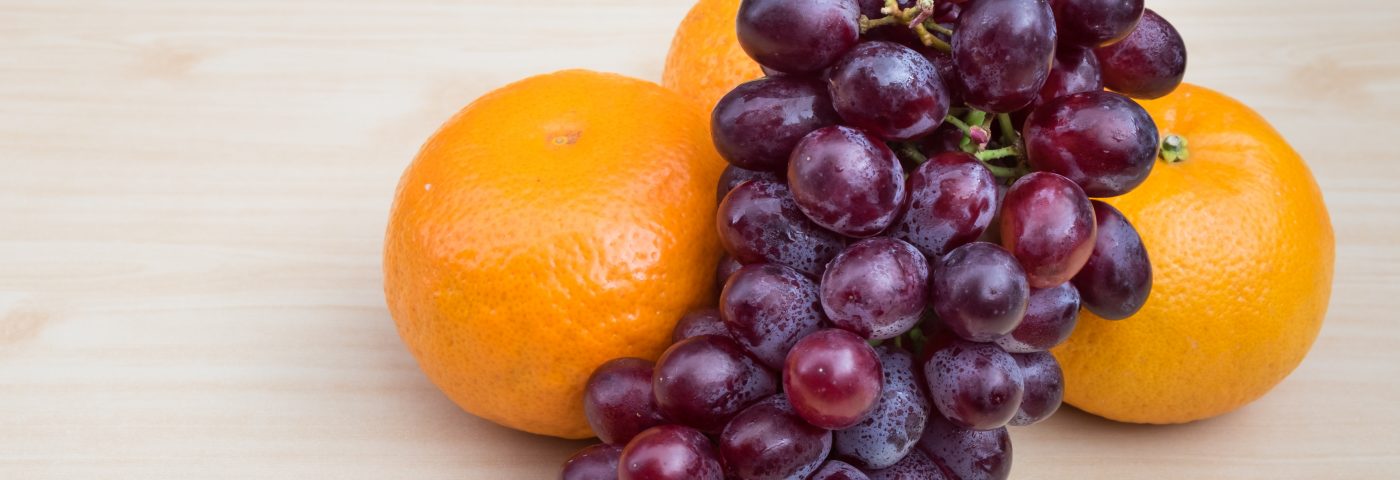Two fruit compounds, found in red grapes and oranges, can act together to improve blood glucose control and blood vessel health, researchers with the University of Warwick, U.K., reported. The finding has potentially far-reaching implications for such associated conditions as obesity, diabetes, and heart disease.
Researchers discovered that the two compounds, when given in combination at higher-than-natural concentrations, could lower blood sugar and improve insulin sensitivity. The study also showed that the combination reduced inflammation in blood vessels and improved dilation of arteries. Given individually, however, the compounds did not have any effect at all.
“This is an incredibly exciting development and could have a massive impact on our ability to treat these diseases. As well as helping to treat diabetes and heart disease, it could defuse the obesity time bomb,” the senior author, Professor Paul Thornalley, said in a press release. The study, “Improved glycemic control and vascular function in overweight and obese subjects by glyoxalase 1 inducer formulation,” was published in the journal Diabetes.
The fruit compounds, called trans-resveratrol and hesperetin, were found to act on a protein called Glo1, which neutralizes a factor called methylglyoxal, a known driver of insulin resistance. Methylglyoxal accumulates during a sugar-rich, high-energy diet, and is a key factor in the development of type 2 diabetes.
Methylglyoxal accumulation also has a detrimental effect on blood vessels, and disrupts cholesterol processing. Experimental studies have shown that blocking the compound improves health in both type 1 and 2 diabetes, as well as in obese individuals, so blocking this process by increasing Glo1 might be a promising approach.
During the study, researchers first tested the two fruit compounds in cultured cells, and then conducted a small clinical trial with 29 overweight and obese individuals, ages 18 to 80. Participants consumed the compounds as a capsule once daily for eight weeks, during which they were asked not to otherwise change their usual diet or physical activity.
In the most overweight subjects, those with a body mass index (BMI) higher than 27.5, the treatment increased the activity of Glo1, while placebo did not have any effects on blood glucose, insulin, or artery health levels.
“Obesity, type 2 diabetes, and cardiovascular disease are at epidemic levels in Westernised countries. Glo1 deficiency has been identified as a driver of health problems in obesity, diabetes, and cardiovascular disease,” Dr. Thornalley said.
Researchers underscored that the effects reached in the trial cannot simply be attained by eating more of the two fruits, since it is not possible to reach the compounds’ high and necessary concentrations in that way.
The research team is now on the lookout for ways to bring the treatment to the clinic. “Diabetic kidney disease will be the initial target to prove effective treatment, for which we are currently seeking commercial investors and partners. Our new pharmaceutical is safe and expected to be an effective add-on treatment taken with current therapy,” Dr. Thornalley said.
“We were really excited to participate in this study with Warwick Medical School, as taking part in world-leading research makes a real difference to our patients both now and in the future,” said Professor Martin Weickert, a consultant in Diabetes and Endocrinology at University Hospitals Coventry and Warwickshire (UHCW) NHS Trust, who collaborated with the Warwick team for the study.
“As well as the positive effects for the UHCW patients who took part in the trial, we hope this study will lead to new treatments to help patients with diabetes and cardiovascular diseases all over the world,” he concluded.



This is just the pefrect answer for all of us